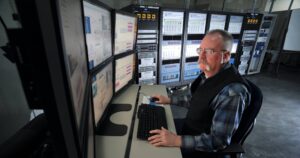Back to: Computer Science JSS 3
Welcome to class!
In today’s class, we’re going to be learning about computer operators as a computer professional. I trust you will enjoy the class!
Computer Professionals – Computer Operators

Gone are the days of punch cards and green screens! While the image of a computer operator hunched over a console might linger, the reality is far more dynamic. Today’s computer operators are the unsung heroes behind the scenes, keeping the digital world humming smoothly. So, buckle up as we dive into the exciting world of these tech wizards!
What exactly do computer operators do?
Think of them as the conductors of a complex IT orchestra. They:
Monitor systems: They’re the watchful eyes, keeping a close eye on everything from CPU usage to network traffic, ensuring everything runs smoothly.
Troubleshoot issues: Hiccups happen. Operators are the problem solvers, diagnosing and fixing issues before they snowball into major disruptions.
Perform scheduled tasks: Think backups, data transfers, software updates – the operators make sure these crucial tasks happen on time, every time.
Maintain security: From firewalls to access control, they’re the gatekeepers, safeguarding systems from unauthorized access and malicious threats.
Stay informed: Technology evolves rapidly, and operators are constantly learning and adapting to new tools and techniques.
But wait, isn’t technology automated these days?
While automation plays a big role, there’s still a crucial human element. Operators provide the critical thinking, problem-solving, and decision-making skills that automation can’t replicate. They’re the ones who understand the bigger picture, anticipating issues and taking proactive measures.
So, what does it take to be a computer operator?
Technical skills: Understanding hardware, software, and networking is a must. Think coding, scripting, and a knack for navigating complex systems.
Problem-solving: When things go wrong, a cool head and analytical thinking are key. Operators need to diagnose issues quickly and efficiently.
Attention to detail: A single missed error can have big consequences. Operators need laser focus and a meticulous eye for accuracy.
Communication: Working with other IT professionals and even non-technical users requires clear and concise communication.
Teamwork: Collaboration is key in today’s IT landscape. Operators need to work effectively with others to achieve common goals.
Remember: The world relies on computer operators more than you might think. So, the next time you seamlessly stream a movie or send an instant message, give a silent shout-out to the unseen heroes keeping the digital world running!
We have come to the end of today’s class. I hope you enjoyed the class!
In case you require further assistance or have any questions, feel free to ask in the comment section below, and trust us to respond as soon as possible. Cheers!
Question Time:
- How has the role of a computer operator evolved over time? What are the biggest differences compared to the past?
- What are some emerging technologies that might impact the future of computer operations?
- Can you compare and contrast the responsibilities of a computer operator with those of a system administrator or a network engineer?
